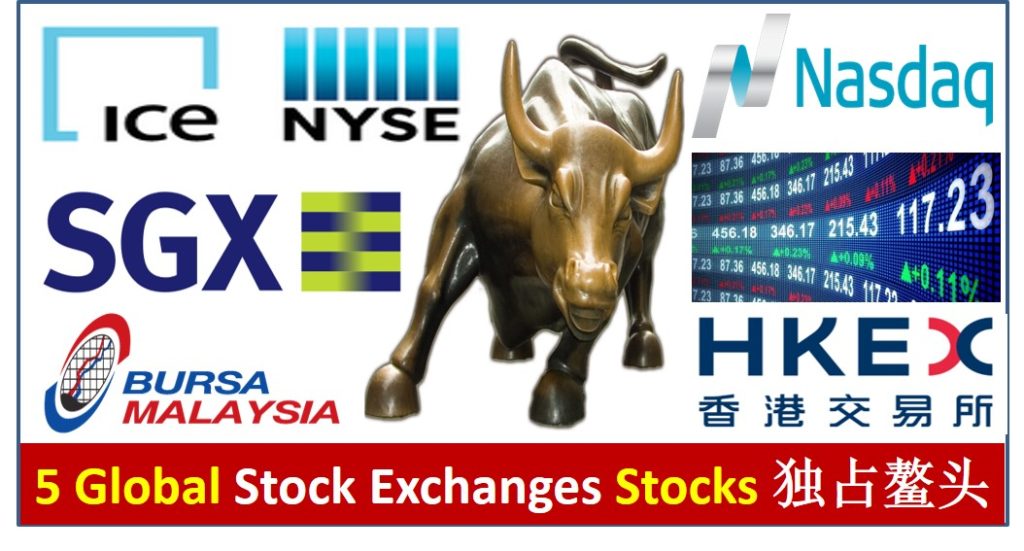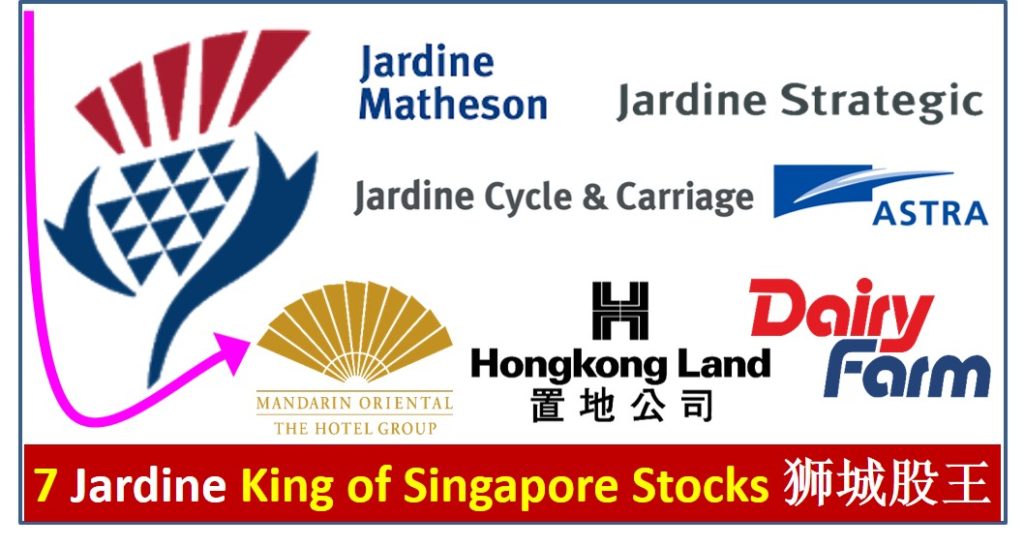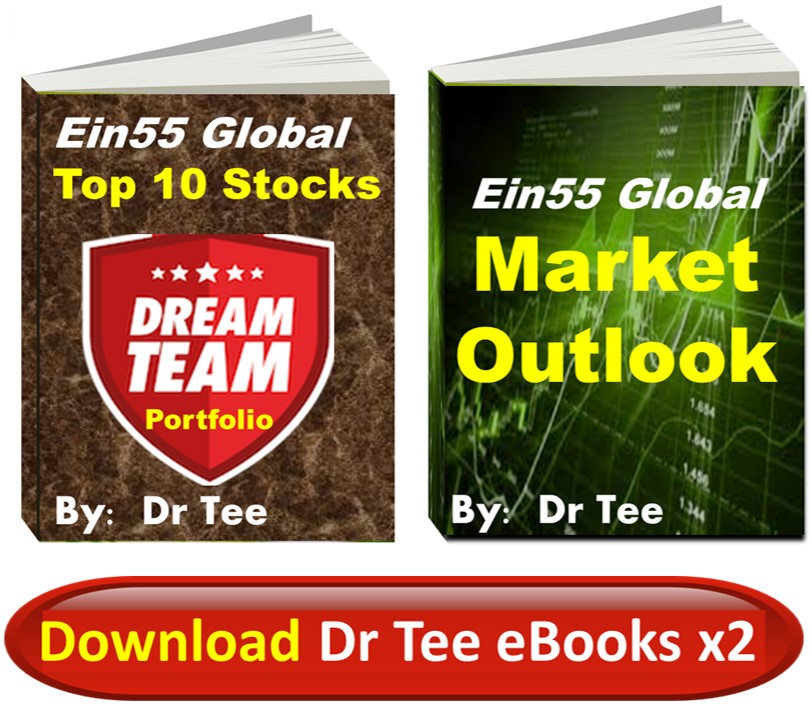
In this article, you will learn 5 global stock exchanges which are also giant stocks in respective countries with applications of 5 unique stock investing strategies.
1) Singapore Exchange (SGX: S68) – Singapore Stock Exchange Giant Stock
2) Intercontinental Exchange (NYSE: ICE) – US NYSE Stock Exchange Giant Stock
3) Nasdaq Inc (NASDAQ: NDAQ) – US NASDAQ Stock Exchange Giant Stock
4) Hong Kong Exchanges and Clearing (HKEx: 388) – Hong Kong Stock Exchange Giant Stock
5) Bursa Malaysia (Bursa: 1818) – Malaysia Stock Exchange Giant Stock
All stock trading activities (buy or sell) have to go through stock exchange, sometimes there is only 1 stock exchange, especially for smaller country such as Singapore, therefore having monopoly advantage (独占鳌头) as an economic moat for the stock exchange business. There is also low risk for a stock exchange to go bankrupt as it is too important to fail without support. Therefore, stock of a stock exchange in a country with growing economy may be considered for longer term investing. However, stock performance of each stock exchange can be different, therefore requiring different strategies, eg. growth, cyclic, dividend, momentum, etc.
Business of stock exchanges are not limited to listing and trading of stocks (equities), may be extended to derivatives (eg. commodities / forex / indices – futures, options, etc), ETFs, bonds (fixed income) and other services. Even a country (eg. US) may have a few stock exchanges but most global stocks only have 1 primary stock exchange for listing (eg. choosing between NYSE or NASDAQ stock exchanges), therefore it is still monopoly in nature (similar to certain show is only available in certain TV channel, no other choice for consumers).
Here, we will focus on 5 common global and local stock exchanges, ranked by market capitalization: No 1 (NYSE / ICE), No 2 (NASDAQ), No 6 (HKEx), No 21 (SGX) and No 25 (Bursa). US NYSE and NASDAQ alone, have already contributed to about 50% of the world stock value, usually are the first choice for global investors and institution in trading, as well as top 2 choices for potential IPO companies, having easy access to global capital to expand the businesses.
Singapore only contributes to about 1% of world stock value. Therefore, Singapore stocks could not affect the US, but US stocks could affect Singapore and the whole world. So, even readers may be interested in 100% Singapore stocks, it is important to pay attention to US stocks and also US economy (also contributing to half of world economy). Hong Kong & China (Shanghai and Shenzhen Stock Exchanges) contribute to about 10% of world stock value, not comparable with size of China as No 2 world economy.
Stock exchanges when listed as stocks, price movement is aligned with local economy and stock market index performance. However, stock exchanges could make money in both bullish and bearish stock market as its business in equity is dependent on trading volume, not high or low of stock prices. Therefore, in recent global stock crisis with fear of Covid-19, trading volume surges to a high (initiated by fearful sellers who hope to sell stocks to minimize downside risk), contributing to strong earnings to exchanges stocks, even during pandemic period of Q1 2020.
1) Singapore Exchange (SGX: S68) – Singapore Stock Exchange Giant Stock
Singapore Exchange was formed in Year 1999 with merging of Stock Exchange of Singapore (SES), Singapore International Monetary Exchange (SIMEX) and Securities Clearing and Computer Services Pte Ltd (SCCS). Since listed in Year 2000, Singapore Exchange has initiated a series of expansion with acquisition, including Singapore Commodity Exchange (futures) and Baltic Exchange (freight indices). Temasek is the largest shareholder (23.3%) of Singapore Exchange, providing additional protection as a strong sponsor. Japan Exchange is the second largest shareholder (3.4%) but investing Singapore Exchange with high share prices in bullish Year 2007.
Singapore Exchange reports improving business results over the past few years (under new CEO, Loh Boon Chye, since Year 2015), supporting its share prices to a new high over the past 10 years. Main earnings contributor is derivatives trading (eg. futures of commodity / forex / indices) which is about half of company net income, following by about 1/3 from equities (stocks), remaining are fixed income (eg. bonds) and other services. In addition, there are increasing customers outside Singapore / Asia, contributing to growing revenue, despite Singapore stock market may not be so active. There are about 800 stocks listed in SGX, an important source of income for Singapore Exchange through stock trading and clearing fees.
Singapore Exchange is the only stock in 30 STI component stocks not affected by recent global stock crisis with Covid-19. In fact, its current share price is even higher than before Covid-19, exceeding $10/share resistance before. Singapore Exchange is a strong fundamental stock with over 30% ROE over the past decade (no debt most of the time), setting a good example to share over 80% net income as dividend with shareholders (average about 3% dividend yield). It can be positioned as a “fixed deposit” stock (with 3% interest) as share prices have been within low optimism of $6-$8/share most of the time in the past decade.
With breakout of $8/share resistance over the past 1 year, Singapore Exchange has become a momentum stock for trading in short term to medium term. Breaking of each resistance (eg. $10/share, $11, etc) would become a signal for short term traders to Buy High Sell Higher (which requires strict S.E.T. trading plan: Stop Loss / Entry / Target Prices). Singapore Exchange stock price is not aligned to STI index, diverging in short term, mainly due to different business performance during pandemic. Some Singapore investors like to trade “safer” stocks with business supported by Covid-19, including trading business of SGX, some healthcare and supermarket stocks (eg. Sheng Siong, SGX: OV8), etc.
2) Intercontinental Exchange (NYSE: ICE) – US NYSE Stock Exchange Giant Stock
Intercontinental Exchange (ICE) has 12 global exchanges, including New York Stock Exchange (NYSE), the largest stock exchange in the world which has about 2800 stocks listed, many are big companies with global giant stocks could be found. Performance of ICE stock price is much better than US stock market index (eg. S&P 500), mainly contributed by its strong business growth with acquisition of other global and local exchanges.
Dr Tee has been to NYSE (11 Wall Street) stock exchange in New York, twice over the past 3 decades. The famous Charging Bull sculpture is nearby, remembering the 1987 Black Monday stock crisis. Indeed, human has proven that every global financial crisis could be overcome eventually, including the current Covid-19 crisis. Even the trading floor of NYSE was closed for a period of time during pandemic but modern online trading has overcome this weakness easily.
ICE is strong in earnings and cash flow with consistent growth over the decade, suitable to position for growth investing, leveraging on long term growth of US / world economy. Covid-19 induced global stock crisis has corrected ICE share price by 1/3 but it has been recovering well, aligning to US stock market. ICE could be an alternative investment to US indices (eg. S&P 500 or NASDAQ) as its performance in shorter term is similar but much better in longer term.
3) Nasdaq Inc (NASDAQ: NDAQ) – US NASDAQ Stock Exchange Giant Stock
Nasdaq stock (NDAQ) has 9 global exchanges, including NASDAQ stock exchange in US and 8 other exchanges in Europe (major shareholder of NASDAQ is Swedish Wallenberg family through Investor AB). NASDAQ is the second largest stock exchange in the world which has about 3300 stocks listed, many are technology companies with global giant stocks could be found. Performance of NASDAQ stock (NDAQ) price is aligned with US stock market index (eg. S&P 500 & NASDAQ), having strong business fundamental but at the prices of relatively higher liability.
NDAQ stock is highly cyclic in prices, aligning with volatile prices of technology sector stocks within NASDAQ stock exchange. After the burst of technology bubble in Year 2000, NASDAQ stock index dropped to 1/3 of value and NDAQ stock was cut by half in share prices. Covid-19 induced global stock crisis has corrected NDAQ share price by about 40% but it has been recovering well, aligning to US stock market. NDAQ stock could be an alternative investment to NASDAQ stock index as its long term growth performance is stronger and less volatile than index.
4) Hong Kong Exchanges and Clearing (HKEx: 388) – Hong Kong Stock Exchange Giant Stock
History of Hong Kong stock market is longer than 100 years. So, Hong Kong stock exchange is more mature and closely regulated than younger stock exchanges of Shanghai and Shenzhen in China. It has experienced British administration (100 years before Year 1997 when returning to China), therefore there is strong western styles in financial system. Despite Shanghai has emerged has new financial center for China, Hong Kong is always the main financial gateway to the western world, especially through the Hong Kong Stock Exchange.
Hong Kong Exchanges and Clearing (HKEx) is a strong growth stock, share price over the past 2 decades has surged by 27 times from $10 to $270/share, partly due to historical opportunity of Hong Kong united with growing China after Year 1997, as well as connection of HKEx with Shanghai and Shenzhen stock exchanges, allowing capital to flow between Hong Kong and mainland China. So, HKEx has become the first choice of stock exchange for IPO for some Asian companies who could easily leverage on capital from China and US investors, if not considering NYSE or NASDAQ stock exchanges.
A few years ago, Dr Tee has visited the building of Hong Kong Stock Exchange at The Exchange Square (building is owned by a property giant stock, Hongkong Land, listed in SGX: H78). However, most of the trading are done online, therefore the physical trading floor is closed permanently since Year 2017, the current Covid-19 crisis does not affect the electronic transaction. In fact, Singapore and global investors could invest in Hong Kong stocks easily with pressing of a few buttons in online trading. There is no withholding tax for dividends of Hong Kong stocks (unlike US stocks require 30% withholding tax for dividends to foreign investors). So, HKEx could gain from both global and local stock investors.
HKEx stock is still strong growth in business but the growth in share prices is slower, therefore entering low optimism in long term. Similar to SGX stock in the past decade (ranging between $6-$8/share for cyclic trading), HKEx stock is still suitable for medium term cyclic trading to Buy Low Sell High every few years, following medium term optimism strategy. Performance of HKEx stock is aligned with Hang Seng stock index in short term but performing much better in longer term.
5) Bursa Malaysia (Bursa: 1818) – Malaysia Stock Exchange Giant Stock
Bursa is Malaysia stock exchange has about 800 stocks listed, many are local companies with businesses in Malaysia. Therefore, there are many local stocks in sectors such as agriculture, plantation and manufacturing. So, a stock with such business may not do well in Singapore (due to higher cost of business operation) but could become a giant stock in Malaysia due to unique local advantage. So, the choice of giant stocks in each stock exchange is different, promising sectors could be country dependent.
Bursa stock (1818) is more cyclic in nature (suitable with Buy Low Sell High, applying long term optimism strategy), falling by nearly half (relative to peak price) in recent Covid-19 global stock crisis, just recovering from long term low optimism. Bursa stock performance is much stronger than KLCI stock index, recovering to price before Covid-19. Fundamentally, Bursa stock is stagnant in business growth, therefore may not be suitable for long term investing. However, there are many other giant stocks within Bursa stock exchange worth consideration for long term.
=====================================
There are 30 STI index component stocks including Singapore Exchange (investor has to focus only on giant stocks for investing):
DBS Bank (SGX: D05), Singtel (SGX: Z74), OCBC Bank (SGX: O39), UOB Bank (SGX: U11), Wilmar International (SGX: F34), Jardine Matheson Holdings JMH (SGX: J36), Jardine Strategic Holdings JSH (SGX: J37), Thai Beverage (SGX: Y92), CapitaLand (SGX: C31), Ascendas Reit (SGX: A17U), Singapore Airlines (SGX: C6L), ST Engineering (SGX: S63), Keppel Corp (SGX: BN4), Singapore Exchange (SGX: S68), Hongkong Land (SGX: H78), Genting Singapore (SGX: G13), Mapletree Logistics Trust (SGX: M44U), Jardine Cycle & Carriage (SGX: C07), Mapletree Industrial Trust (SGX: ME8U), City Development (SGX: C09), CapitaLand Mall Trust (SGX: C38U), CapitaLand Commercial Trust (SGX: C61U), Mapletree Commercial Trust (SGX: N2IU), Dairy Farm International (SGX: D01), UOL (SGX: U14), Venture Corporation (SGX: V03), YZJ Shipbldg SGD (SGX: BS6), Sembcorp Industries (SGX: U96), SATS (SGX: S58), ComfortDelGro (SGX: C52).
Stock exchange is a gateway for businesses to leverage on enormous capital from local and global investors through stock trading and investing. Stock performance of a stock exchange is also a reflection of a country stock market strength and economy growth, especially over a longer term. A smart investor may consider to invest in stock exchange stock directly (usually lower risk due to its unique financial role, especially if it is a monopoly stock) or having the choice to invest in individual giant stocks listed under the stock exchange.
Drop by Dr Tee free 4hr investment course to learn how to position in global giant stocks with 10 unique stock investing strategies, knowing What to Buy, When to Buy/Sell.
Learn further from Dr Tee valuable 7hr Online Course, both English (How to Discover Giant Stocks) and Chinese (价值投资法: 探测强巨股) options, specially for learners who prefer to master stock investment strategies of over 100 global giant stocks at the comfort of home.
You are invited to join Dr Tee private investment forum (educational platform, no commercial is allowed) to learn more investment knowledge, interacting with over 9000 members.


